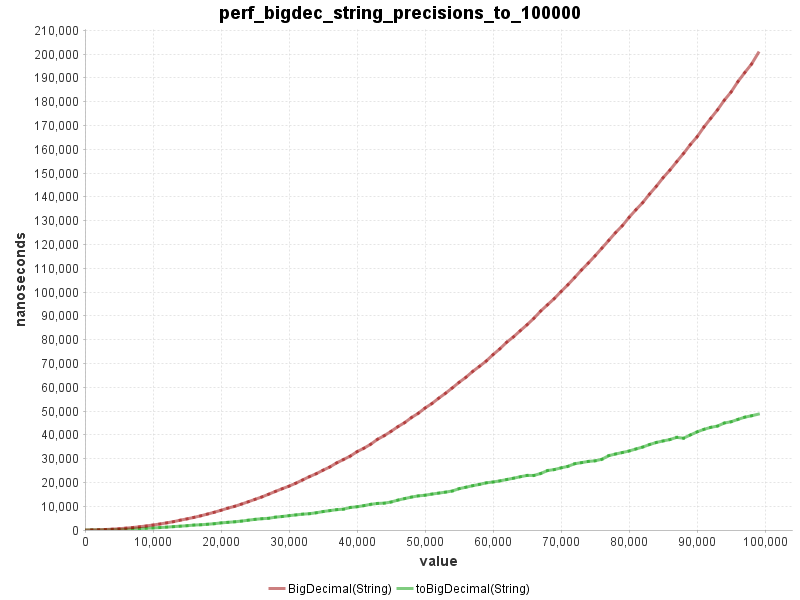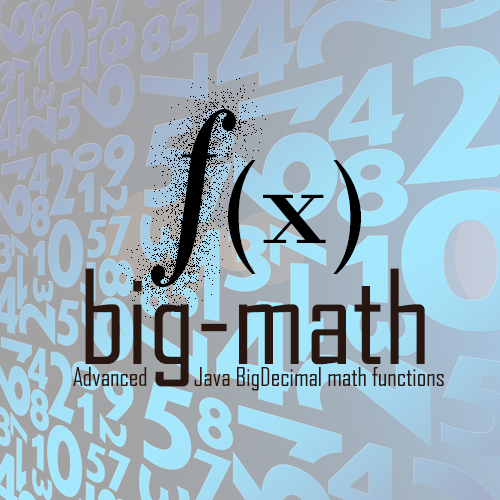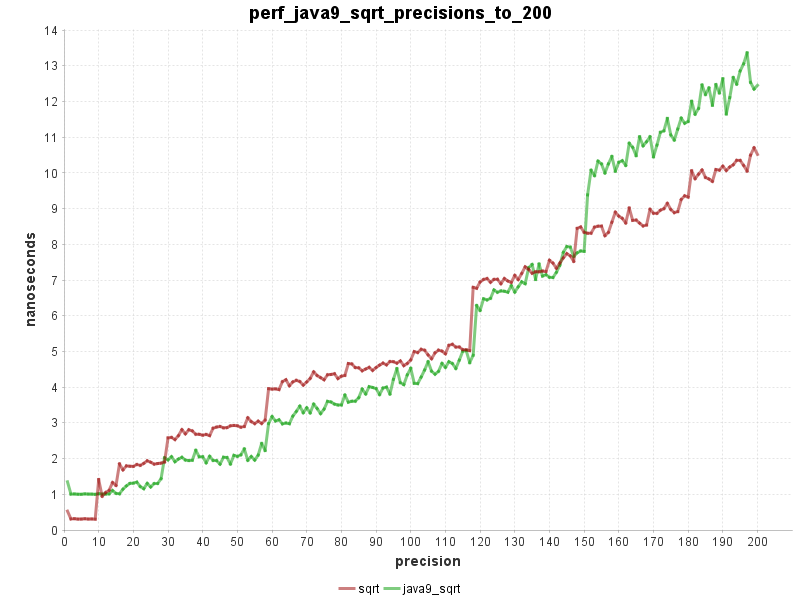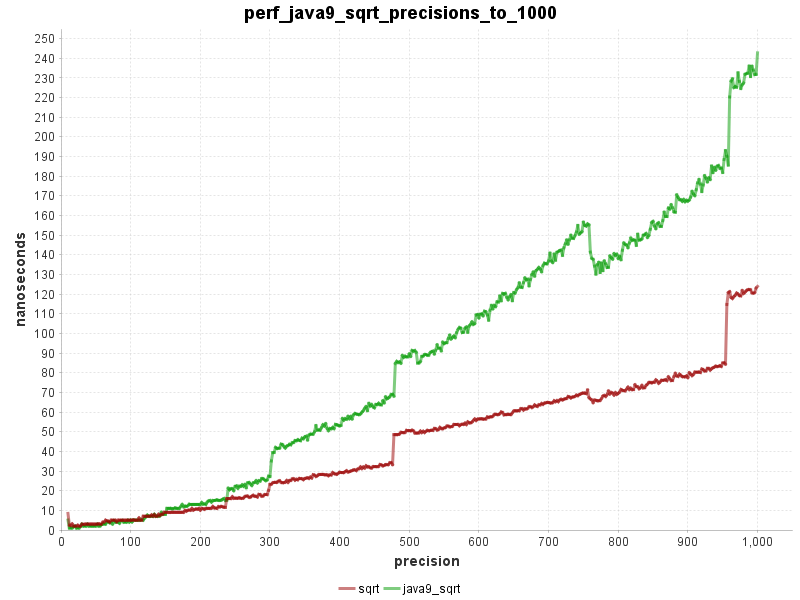Advanced Java BigDecimal math functions (pow, sqrt, log, sin, ...) using arbitrary precision.
See also the official Big-Math Documentation.
The class BigDecimalMath provides efficient and accurate implementations for:
log(BigDecimal, MathContext)exp(BigDecimal, MathContext)pow(BigDecimal, BigDecimal, MathContext)calculates x^ysqrt(BigDecimal, MathContext)root(BigDecimal, BigDecimal, MathContext)calculates the n'th root of xsin(BigDecimal, MathContext)cos(BigDecimal, MathContext)tan(BigDecimal, MathContext)asin(BigDecimal, MathContext)acos(BigDecimal, MathContext)atan(BigDecimal, MathContext)atan2(BigDecimal, BigDecimal, MathContext)sinh(BigDecimal, MathContext)cosh(BigDecimal, MathContext)tanh(BigDecimal, MathContext)asinh(BigDecimal, MathContext)acosh(BigDecimal, MathContext)atanh(BigDecimal, MathContext)toDegrees(BigDecimal, MathContext)converts from radians to degreestoRadians(BigDecimal, MathContext)converts from degrees to radianspow(BigDecimal, long, MathContext)calculates x^y forlongyfactorial(int)calculates n!bernoulli(int)calculates Bernoulli numberspi(MathContext)calculates pi to an arbitrary precisione(MathContext)calculates e to an arbitrary precisiontoBigDecimal(String)creates aBigDecimalfrom string representation (faster thanBigDecimal(String))mantissa(BigDecimal)extracts the mantissa from aBigDecimal(mantissa * 10^exponent)exponent(BigDecimal)extracts the exponent from aBigDecimal(mantissa * 10^exponent)integralPart(BigDecimal)extracts the integral part from aBigDecimal(everything before the decimal point)fractionalPart(BigDecimal)extracts the fractional part from aBigDecimal(everything after the decimal point)isIntValue(BigDecimal)checks whether theBigDecimalcan be represented as anintvalueisDoubleValue(BigDecimal)checks whether theBigDecimalcan be represented as adoublevalueroundWithTrailingZeroes(BigDecimal, MathContext)rounds aBigDecimalto an arbitrary precision with trailing zeroes.
For calculations with arbitrary precision you need to specify how precise you want a calculated result.
For BigDecimal calculations this is done using the MathContext.
MathContext mathContext = new MathContext(100);
System.out.println("sqrt(2) = " + BigDecimalMath.sqrt(BigDecimal.valueOf(2), mathContext));
System.out.println("log10(2) = " + BigDecimalMath.log10(BigDecimal.valueOf(2), mathContext));
System.out.println("exp(2) = " + BigDecimalMath.exp(BigDecimal.valueOf(2), mathContext));
System.out.println("sin(2) = " + BigDecimalMath.sin(BigDecimal.valueOf(2), mathContext));will produce the following output on the console:
sqrt(2) = 1.414213562373095048801688724209698078569671875376948073176679737990732478462107038850387534327641573
log10(2) = 0.3010299956639811952137388947244930267681898814621085413104274611271081892744245094869272521181861720
exp(2) = 7.389056098930650227230427460575007813180315570551847324087127822522573796079057763384312485079121795
sin(2) = 0.9092974268256816953960198659117448427022549714478902683789730115309673015407835446201266889249593803
Since many mathematical constants have an infinite number of digits you need to specfiy the desired precision for them as well:
MathContext mathContext = new MathContext(100);
System.out.println("pi = " + BigDecimalMath.pi(mathContext));
System.out.println("e = " + BigDecimalMath.e(mathContext));will produce the following output on the console:
pi = 3.141592653589793238462643383279502884197169399375105820974944592307816406286208998628034825342117068
e = 2.718281828459045235360287471352662497757247093699959574966967627724076630353547594571382178525166427
Additional BigDecimalMath provides several useful methods (that are plain missing for BigDecimal):
MathContext mathContext = new MathContext(100);
System.out.println("mantissa(1.456E99) = " + BigDecimalMath.mantissa(BigDecimal.valueOf(1.456E99)));
System.out.println("exponent(1.456E99) = " + BigDecimalMath.exponent(BigDecimal.valueOf(1.456E99)));
System.out.println("integralPart(123.456) = " + BigDecimalMath.integralPart(BigDecimal.valueOf(123.456)));
System.out.println("fractionalPart(123.456) = " + BigDecimalMath.fractionalPart(BigDecimal.valueOf(123.456)));
System.out.println("isIntValue(123) = " + BigDecimalMath.isIntValue(BigDecimal.valueOf(123)));
System.out.println("isIntValue(123.456) = " + BigDecimalMath.isIntValue(BigDecimal.valueOf(123.456)));
System.out.println("isDoubleValue(123.456) = " + BigDecimalMath.isDoubleValue(BigDecimal.valueOf(123.456)));
System.out.println("isDoubleValue(1.23E999) = " + BigDecimalMath.isDoubleValue(new BigDecimal("1.23E999")));will produce the following output on the console:
mantissa(1.456E99) = 1.456
exponent(1.456E99) = 99
integralPart(123.456) = 123
fractionalPart(123.456) = 0.456
isIntValue(123) = true
isIntValue(123.456) = false
isDoubleValue(123.456) = true
isDoubleValue(1.23E999) = false
The BigDecimalMath class is thread-safe and can be used in concurrent use cases.
The class BigDecimalStream provides factory methods for streams of BigDecimal elements.
Overloaded variants of range(start, end, step) provide sequential elements equivalent to IntStream.range(start, end) but with configurable step (exclusive the end value).
Similar methods for the rangeClosed() (inclusive the end value) are available.
The streams are well behaved when used in parallel mode.
The following code snippet:
System.out.println("Range [0, 10) step 1 (using BigDecimal as input parameters)");
BigDecimalStream.range(BigDecimal.valueOf(0), BigDecimal.valueOf(10), BigDecimal.valueOf(1), mathContext)
.forEach(System.out::println);
System.out.println("Range [0, 10) step 3 (using long as input parameters)");
BigDecimalStream.range(0, 10, 3, mathContext)
.forEach(System.out::println);produces this output:
Range [0, 10) step 1 (using BigDecimal as input parameters)
0
1
2
3
4
5
6
7
8
9
Range [0, 12] step 3 (using long as input parameters)
0
3
6
9
12
Many mathematical functions have results that have many digits (often an infinite number of digits). When calculating these functions you need to specify the number of digits you want in the result, because calculating an infinite number of digits would take literally forever and consume an infinite amount of memory.
The MathContext contains a precision and information on how to round the last digits, so it is an obvious choice to specify the desired precision of mathematical functions.
The convenience class DefaultBigDecimalMath was added that provides mathematical functions
where the MathContext must not be passed every time.
Please refer to the chapter DefaultBigDecimalMath
I specified a precision of n digits, but the results have completely different number of digits after the decimal point. Why?
It is a common misconception that the precision defines the number of digits after the decimal point.
Instead the precision defines the number of relevant digits, independent of the decimal point. The following numbers all have a precision of 3 digits:
- 12300
- 1230
- 123
- 12.3
- 1.23
- 0.123
- 0.0123
To specify the number of digits after the decimal point use BigDecimal.setScale(scale, mathContext).
The mathematical functions in BigDecimalMath are heavily optimized to calculate the result in the specified precision, but in order to calculate them often tens or even hundreds of basic operations (+, -, *, /) using BigDecimal are necessary.
If the calculation of your function is too slow for your purpose you should verify whether you really need the full precision in your particular use case. Sometimes you can adapt the precision depending on input factors of your calculation.
For the mathematical background and performance analysis please refer to this article:
Some of the implementation details are explained here:
Why is there BigDecimalMath.toBigDecimal(String) if Java already has a BigDecimal(String) constructor?
The BigDecimal(String) constructor as provided by Java gets increasingly slower if you pass longer strings to it.
The implementation in Java 11 and before is O(n^2).
If you want to convert very long strings (10000 characters or longer) then this slow constructor may become an issue.
BigDecimalMath.toBigDecimal(String) is a drop-in replacement with the same functionality
(converting a string representation into a BigDecimal) but it is using a faster recursive implementation.
The following chart shows the time necessary to create a BigDecimal from a string representation of increasing length:

Since Java 9 the BigDecimal class has a new function sqrt(BigDecimal, MathContext).
If you only need the square root function then by all means use the provided standard function instead of this library.
If you need any other high level function then you should still consider using this library.
For high precision (above 150 digits) the current implementation of
Java 9 BigDecimal.sqrt() becomes increasingly slower than BigDecimalMath.sqrt().
You should consider whether the increased performance is worth having an additional dependency.
The following charts shows the time needed to calculate the square root of 3.1 with increasing precision.
The following charts show the time needed to calculate the functions over a range of values with a precision of 300 digits.
The class BigComplex represents complex numbers in the form (a + bi).
It follows the design of BigDecimal with some convenience improvements like overloaded operator methods.
A big difference to BigDecimal is that BigComplex.equals() implements the mathematical equality
and not the strict technical equality.
This was a difficult decision because it means that BigComplex behaves slightly different than BigDecimal
but considering that the strange equality of BigDecimal is a major source of bugs we
decided it was worth the slight inconsistency.
If you need the strict equality use BigComplex.strictEquals().
reimadd(BigComplex)add(BigComplex, MathContext)add(BigDecimal)add(BigDecimal, MathContext)add(double)subtract(BigComplex)subtract(BigComplex, MathContext)subtract(BigDecimal)subtract(BigDecimal, MathContext)subtract(double)multiply(BigComplex)multiply(BigComplex, MathContext)multiply(BigDecimal)multiply(BigDecimal, MathContext)multiply(double)divide(BigComplex)divide(BigComplex, MathContext)divide(BigDecimal)divide(BigDecimal, MathContext)divide(double)reciprocal(MathContext)conjugate()negate()abs(MathContext)angle(MathContext)absSquare(MathContext)isReal()re()im()round(MathContext)hashCode()equals(Object)strictEquals(Object)toString()valueOf(BigDecimal)valueOf(double)valueOf(BigDecimal, BigDecimal)valueOf(double, double)valueOfPolar(BigDecimal, BigDecimal, MathContext)valueOfPolar(double, double, MathContext
The class BigComplexMath is the equivalent of BigDecimalMath and contains mathematical functions in the complex domain.
sin(BigComplex, MathContext)cos(BigComplex, MathContext)tan(BigComplex, MathContext)asin(BigComplex, MathContext)acos(BigComplex, MathContext)atan(BigComplex, MathContext)acot(BigComplex, MathContext)exp(BigComplex, MathContext)log(BigComplex, MathContext)pow(BigComplex, long, MathContext)pow(BigComplex, BigDecimal, MathContext)pow(BigComplex, BigComplex, MathContext)sqrt(BigComplex, MathContext)root(BigComplex, BigDecimal, MathContext)root(BigComplex, BigComplex, MathContext)
The class DefaultBigDecimalMath is a wrapper around BigDecimalMath that passes always the current MathContext to the
functions that need a MathContext argument.
The initial default MathContext is equivalent to MathContext.DECIMAL128 but this can be overridden by setting the following system properties:
ch.obermuhlner.math.big.default.precisionto a positive integer precision (default=34)ch.obermuhlner.math.big.default.roundingto a RoundingMode name (default=HALF_UP)
It is also possible to programmatically set the default MathContext using setDefaultMathContext(MathContext).
It is recommended to set the desired precision in the MathContext very early in the startup of the application and to not change it afterwards.
Important: Avoid the pitfall of setting the precision temporarily using setDefaultMathContext(MathContext) for a calculation.
This can lead to race conditions and calculations with the wrong precision if other threads in your application do the same thing.
To set a temporary MathContext you have to choice to use either:
DefaultBigDecimalMath.createLocalMathContext()in a try-with-resources statementDefaultBigDecimalMath.withLocalMathContext()with a lambda function
Example code using DefaultBigDecimalMath.createLocalMathContext():
System.out.println("Pi[default]: " + DefaultBigDecimalMath.pi());
try (DefaultBigDecimalMath.LocalMathContext context = DefaultBigDecimalMath.createLocalMathContext(5)) {
System.out.println("Pi[5]: " + DefaultBigDecimalMath.pi());
try (DefaultBigDecimalMath.LocalMathContext context2 = DefaultBigDecimalMath.createLocalMathContext(10)) {
System.out.println("Pi[10]: " + DefaultBigDecimalMath.pi());
};
System.out.println("Pi[5]: " + DefaultBigDecimalMath.pi());
};
System.out.println("Pi[default]: " + DefaultBigDecimalMath.pi());Example code using DefaultBigDecimalMath.withLocalMathContext():
System.out.println("Pi[default]: " + DefaultBigDecimalMath.pi());
DefaultBigDecimalMath.withLocalMathContext(5, () -> {
System.out.println("Pi[5]: " + DefaultBigDecimalMath.pi());
DefaultBigDecimalMath.withLocalMathContext(10, () -> {
System.out.println("Pi[10]: " + DefaultBigDecimalMath.pi());
});
System.out.println("Pi[5]: " + DefaultBigDecimalMath.pi());
});
System.out.println("Pi[default]: " + DefaultBigDecimalMath.pi());Both snippets will give the following output:
Pi[default]: 3.141592653589793238462643383279503
Pi[5]: 3.1416
Pi[10]: 3.141592654
Pi[5]: 3.1416
Pi[default]: 3.141592653589793238462643383279503The temporary MathContext are stored in ThreadLocal variables
and will therefore not conflict with each other when used in multi-threaded use case.
Important: Due to the ThreadLocal variables the temporary MathContext will
not be available in other threads.
This includes streams using parallel(), thread pools and manually started threads.
If you need temporary MathContext for calculations then you must
set the local MathContext inside every separate thread.
try (DefaultBigDecimalMath.LocalMathContext context = DefaultBigDecimalMath.createLocalMathContext(5)) {
BigDecimalStream.range(0.0, 1.0, 0.01, DefaultBigDecimalMath.currentMathContext())
.map(b -> DefaultBigDecimalMath.cos(b))
.map(b -> "sequential " + Thread.currentThread().getName() + " [5]: " + b)
.forEach(System.out::println);
BigDecimalStream.range(0.0, 1.0, 0.01, DefaultBigDecimalMath.currentMathContext())
.parallel()
.map(b -> {
try (DefaultBigDecimalMath.LocalMathContext context2 = DefaultBigDecimalMath.createLocalMathContext(5)) {
return DefaultBigDecimalMath.cos(b);
}
})
.map(b -> "parallel " + Thread.currentThread().getName() + " [5]: " + b)
.forEach(System.out::println);
}The class BigFloat is an experimental wrapper around BigDecimal which simplifies the consistent usage of the MathContext and provides a simpler API for calculations.
The API for calculations is simplified and more consistent with the typical mathematical usage.
-
Factory methods on the
Contextclass for values:valueOf(BigFloat)valueOf(BigDecimal)valueOf(int)valueOf(long)valueOf(double)valueOf(String)pi()e()
-
All standard operators:
add(x)subtract(x)multiply(x)divide(x)remainder(x)pow(y)root(y)
-
Calculation methods are overloaded for different value types:
add(BigFloat)add(BigDecimal)add(int)add(long)add(double)- ...
-
Mathematical functions are written in the traditional form:
abs(x)log(x)sin(x)min(x1, x2, ...)max(x1, x2, ...)- ...
-
Support for advanced mathematical functions:
sqrt(x)log(x)exp(x)sin(x)cos(x)tan(x)- ...
-
Methods to access parts of a value:
getMantissa()getExponent()getIntegralPart()getFractionalPart()
-
Methods to verify value type conversions:
isIntValue()isDoubleValue()
-
Equals and Hashcode methods:
equals(Object)returns whether twoBigFloatvalues are mathematically the samehashCode()consistent withequals(Object)
-
Comparison methods:
isEqual(BigFloat)isLessThan(BigFloat)isLessThanOrEqual(BigFloat)isGreaterThan(BigFloat)isGreaterThanOrEqual(BigFloat)
-
Sign methods:
signum()isNegative()isZero()isPositive()
Before doing any calculations you need to create a Context specifying the precision used for all calculations.
Context context = BigFloat.context(100); // precision of 100 digits
Context anotherContext = BigFloat.context(new MathContext(10, RoundingMode.HALF_UP); // precision of 10 digits, rounding half upThe Context can then be used to create the first value of the calculation:
BigFloat value1 = context.valueOf(640320);The BigFloat instance holds a reference to the Context. This context is then passed from calculation to calculation.
BigFloat value2 = context.valueOf(640320).pow(3).divide(24);
BigFloat value3 = BigFloat.sin(value2);The BigFloat result can be converted to other numerical types:
BigDecimal bigDecimalValue = value3.toBigDecimal();
double doubleValue = value3.toDouble();
long longValue = value3.toLong();
int intValue = value3.toInt();The BigFloatStream provides similar stream factories as BigDecimalStream that will produce streams of BigFloat elements.
Since release 2.0.1 the deployed big-math Jar file contains now a module name for the Jigsaw module system (Java 9 and later).
This allows it to be used as automatic module with a well defined module name instead of deriving the name magically from the Jar file name.
The module name follows the reverse domain convention and is: ch.obermuhlner.math.big
The big-math Jar file is also OSGi compatible.
The MANIFEST.MF contains all the necessary headers and exports the public packages:
ch.obermuhlner.math.bigch.obermuhlner.math.big.stream
If you want to use big-math library in Kotlin you may do so directly, or you use the kotlin-big-math library that provides additional features, like operators.
To use the Java library you can either download the newest version of the .jar file from the published releases on Github or use the following dependency to Maven Central in your build script (please verify the version number to be the newest release):
<dependency>
<groupId>ch.obermuhlner</groupId>
<artifactId>big-math</artifactId>
<version>2.3.2</version>
</dependency>repositories {
mavenCentral()
}
dependencies {
compile 'ch.obermuhlner:big-math:2.3.2'
}







